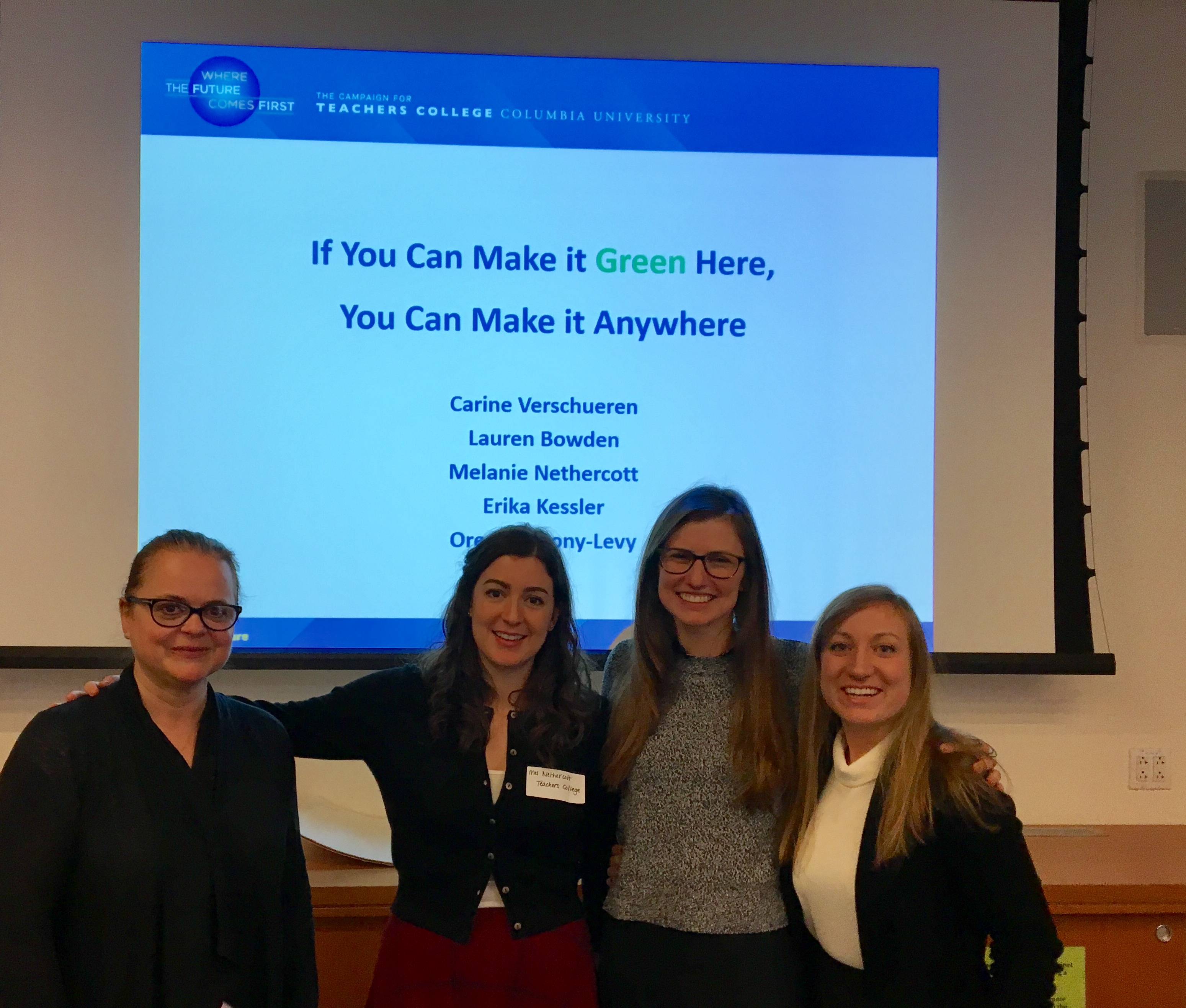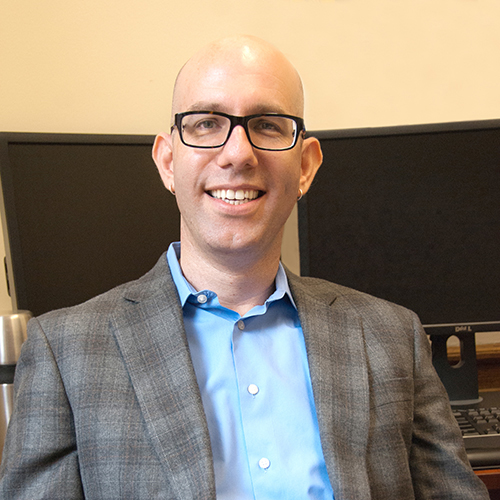Four TC students and their professor are helping New York City evaluate a pioneering environmental program
Since 2009, New York City has been the only major municipality in the country to require each of its public schools to appoint a sustainability coordinator – part of the city’s broader sustainability plan to send zero waste to landfills by the year 2030. In a city of 1.1 million students and more than 1,700 public schools “that gives you a huge team of change agents who potentially can work miracles across the five boroughs,” says Teachers College’s Oren Pizmony-Levy, Assistant Professor of International and Comparative Education.
But are the school coordinators making any impact – and if so, what kind? No one has been able to say for sure, because the coordinator role is to some extent open to interpretation by the teacher or staff member who is appointed or takes it on at each school. And while the New York City Department of Education (NYCDOE) has been collecting data about the coordinators, it lacks the expertise and capacity to analyze that data.

SUSTAINABILITY SQUAD From left: Verschueren, Nethercott, Bowden and Kessler.
Enter Pizmony-Levy and four of his students in TC’s International & Comparative Education Program – master’s degree candidates Lauren Bowden, Melanie Nethercott and Erika Kessler and second-year doctoral candidate Carine Verschueren. Working on a pro bono basis, they have put the city’s data in useable form, mined it to draw some basic conclusions, and raised some important questions about what, ultimately, the program is trying to achieve. In late December, the TC team delivered a presentation of their work – titled “If You Can Make It Green Here, You Can Make It Anywhere” – at a conference at New York University convened by the Environmental Education Advisory Council, a nonprofit that is assisting NYCDOE on the sustainability coordinators project.
“We asked the coordinators to discuss what ‘sustainability’ means to them. There’s not much research on teachers’ views of this big, amorphous concept, which very obviously must affect how they do their jobs as coordinators.”
— Melanie Nethercott
Bowden, a former Houston elementary school teacher, was tasked with “cleaning up” NYCDOE’s raw data so that it could be mined with a statistical tool called Stata.
“Everything had been dumped into one giant spread sheet in a quasi-logical way,” she recalls. “We literally got an Excel file with 1,400 records, very messy – which wasn’t DOE’s fault, the data had been collected by another agency.”
Bowden conducted a preliminary analysis to learn who the coordinators are – specifically, what other roles they play at their schools – and what each has pledged to do. Most turn out to be science or social studies teachers, she reports, and they tend to focus on resource management – energy conservation and recycling – rather than on creating new courses or other experiences aimed at prompting students to think more broadly about sustainability issues.
Nethercott, who previously designed education programs for a global nonprofit, conducted a secondary analysis of the cleaned-up data that Bowden provided.
“We asked the coordinators to discuss what ‘sustainability’ means to them,” she says. “There’s not much research on teachers’ views of this big, amorphous concept, which very obviously must affect how they do their jobs as coordinators.”
Nethercott found that even though many of the coordinators do focus on resource management, there is considerable variety in how they define their roles. And even though they operate at the school level, “over half situate sustainability in a bigger context – the community, the nation, the world.

TC’s research considers whether the school sustainability coordinators can go beyond resource management to create new courses and directly engage students.
“The three pillars of sustainability are environmental, which means resource management; social, which refers to equity, social justice and decreasing poverty; and economics, which focuses on how communities can benefit from economic growth,” Nethercott says. “One of the strengths of sustainability is pluralism in defining it. But it would be great if the coordinators could focus on the second two pillars more.”
“Our data shows that if a coordinator is a science teacher, she or he tends to define sustainability in ways that keep everything within science, as opposed to, say, social studies. You want them to cross disciplines and create a sustainable whole-school approach to transmitting these values.”
— Carine Verschueren
Kessler, a former Chinese studies and international business major -- and current TC Zankel Fellow – is working with six of New York’s Title I schools (those that, because they have a large concentration of low-income students, receive supplemental funds to assist in meeting students’ educational goals) on developing student Green Teams. Not many schools have these teams, which are usually created by student councils, and Kessler’s goal is find ways to increase such student engagement. (Learn more about the Zankel Fellows and Zankel Fellowships offered by the Teachers College Working Group on Environmental and Sustainability Education.)
And then there is Verschueren, a mid-career professional and mother of two who is originally from Belgium. With Pizmony-Levy as her adviser, she is writing her dissertation on the politics surrounding New York City’s sustainability movement. Her focus is on how the school coordinators’ program came about, and the different directions it has taken under the Bloomberg and de Blasio mayoral administrations.
“I’ve worked in the field with education NGOs, done research in Kenya on how education does and doesn’t serve nomadic tribes there, and now I’m focused on sustainability,” she says. “The common thread is global norms and values and how they’re implemented in different education systems – how they’re incorporated, or not.”
Verschueren applauds the city’s decision to extend its sustainability movement to the schools – work she sees as critical to building good citizenship. As a policy analyst, however, she’s keenly aware of how even seemingly bureaucratic aspects of the effort, such as the fact that NYCDOE’s Office of Sustainability is housed in its Division of Facilities, have political implications.
“The institutionalization of sustainability impacts what they do and don’t do,” she says. “That fact alone move things in the direction of resource management rather than curriculum and citizenship education.” she says.

Pizmony-Levy’s courses have inspired even number-phobic students to pursue quantitative research.
There are some hopeful signs that things could move in the latter direction: Where the Bloomberg administration focused on the economic and environmental pillars of sustainability, “de Blasio has added the equity piece, but it hasn’t yet trickled down to DOE,” she says. “But maybe that will happen during his second term.” Indeed, Bowden’s findings show that coordinators who participated in a recent one-day training “expo” held by NYCDOE are more likely to address curricular issues or involve students in some broader way.
Then, too, Verschueren says, American public education, with its emphasis on standardized testing, is “fragmented and discipline-specific,” while sustainability by nature needs to be cross-disciplinary.
“Our data shows that if a coordinator is a science teacher, she or he tends to define sustainability in ways that keep everything within science, opposed to, say, social studies,” she says. “You want them to cross disciplines and create a sustainable whole-school approach to transmitting these values.”
Officials at NYCDOE clearly are listening.
“Oren’s students were very impressive in their presentation of their research findings,” says Meredith McDermott, Director of Sustainability. “I’m confident that their collective contribution will have long-term impact on our outreach and engagement strategies. I can’t believe it was their first time co-presenting this material. I told them it certainly was not their last.”
The TC team is “helping us to identify new opportunities and methods to strengthen and expand sustainability in the city’s schools,” adds Thaddeus Copeland, Deputy Director of Sustainability, Operations. “Some of their research findings are informing our strategic plan to improve school sustainability.”
Indeed, this week, TC is hosting its first workshop for NYCDOE sustainability coordinators, including activities that build on insights from the students’ research. For Pizmony-Levy’s team, there’s a lot riding on the outcome.
“As the U.N. says, education/school plays a crucial role in transmitting these kinds of values,” says Verschueren. “With coordinators reaching 1.1 million students at 1,700 schools, there’s an incredible opportunity and potential for change. You just have to know how to do it.” – Joe Levine